 The central theme of this poignant, rather dark story from Katherine Porter is a mother’s relationship with her devoted special needs son. The woman is obsessed with appearances. Although she professes greater love for him than her other children combined, one wonders if this is out of pity or, worse, a mere show for neighbors. Similarly, are her tears as she takes the boy to the County Home the result of losing him, a sense of failure/shame as a mother, and/or (as the narrator cruelly suggests) wishing he had never been born? Other themes: struggle against poverty, family, appearances, guilt. More…
The central theme of this poignant, rather dark story from Katherine Porter is a mother’s relationship with her devoted special needs son. The woman is obsessed with appearances. Although she professes greater love for him than her other children combined, one wonders if this is out of pity or, worse, a mere show for neighbors. Similarly, are her tears as she takes the boy to the County Home the result of losing him, a sense of failure/shame as a mother, and/or (as the narrator cruelly suggests) wishing he had never been born? Other themes: struggle against poverty, family, appearances, guilt. More…
Category Archives: Short Stories
The Replacement
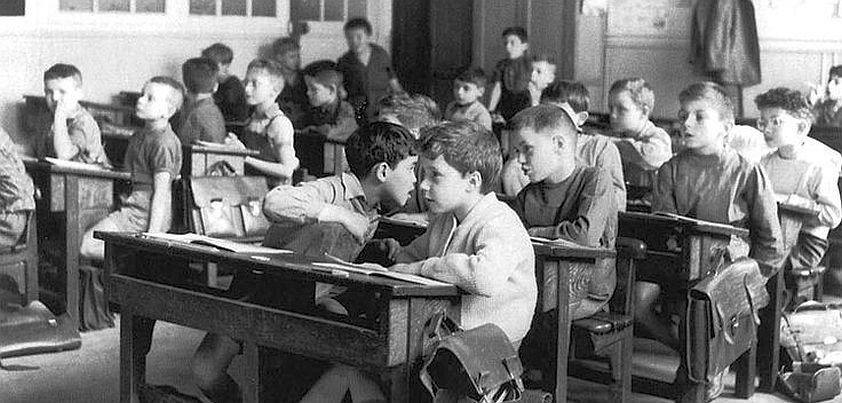 This story by Alain Robbe-Grillet is an example of the Nouveau Roman literary trend of the 1950s. Rather than following a traditional short story structure, The Replacement inter-weaves three seemingly unrelated plot lines involving a frustrated teacher and his bored students, a story they are reading in class, and a schoolboy outside interacting strangely with a tree. In presenting the sequence of events objectively with no authorial interpretation, readers are left to draw their own conclusions as to the story’s meaning and message. Themes could include the attainment of knowledge, the reading process, perseverance, classroom learning vs. curiosity and self-discovery. More…
This story by Alain Robbe-Grillet is an example of the Nouveau Roman literary trend of the 1950s. Rather than following a traditional short story structure, The Replacement inter-weaves three seemingly unrelated plot lines involving a frustrated teacher and his bored students, a story they are reading in class, and a schoolboy outside interacting strangely with a tree. In presenting the sequence of events objectively with no authorial interpretation, readers are left to draw their own conclusions as to the story’s meaning and message. Themes could include the attainment of knowledge, the reading process, perseverance, classroom learning vs. curiosity and self-discovery. More…
The First Seven Years
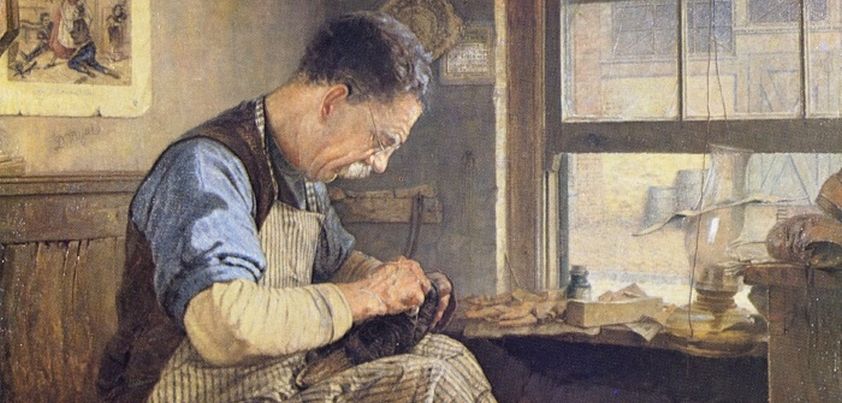 The major theme of this story from Bernard Malamud, with its allusion to the biblical tale of Jacob and Rebecca, is materialism vs. spiritualism. An aging, ailing shoemaker is excited to identify a potential suitor with good financial prospects for his nineteen-year-old daughter. His dreams are shattered when the girl, an avid reader of the classics, rejects the man as being a materialist with “no soul”. He later experiences an epiphany upon learning that she already shares a romantic interest… with his equally sensitive but poorly educated, much older workshop assistant. Other themes: insensitivity, independence, self-learning, worldliness vs. love. More…
The major theme of this story from Bernard Malamud, with its allusion to the biblical tale of Jacob and Rebecca, is materialism vs. spiritualism. An aging, ailing shoemaker is excited to identify a potential suitor with good financial prospects for his nineteen-year-old daughter. His dreams are shattered when the girl, an avid reader of the classics, rejects the man as being a materialist with “no soul”. He later experiences an epiphany upon learning that she already shares a romantic interest… with his equally sensitive but poorly educated, much older workshop assistant. Other themes: insensitivity, independence, self-learning, worldliness vs. love. More…
Tong
 This story by Francisco Sionil José follows a courtship between a Filipino accountant and young Chinese woman. The relationship faces opposition from their families as inter-cultural (especially Filipino-Chinese) marriages are frowned upon by both communities. Moreover, one obstacle not easily overcome is a “tong” (debt that must be repaid). The girl is promised to a fat, bald Chinese man old enough to be her father in exchange for favors done for her family. After a passionate final night together, they are separated forever. Themes include forbidden love, cultural division and conflict, socioeconomic inequality, exploitation/human trafficking, family honor and loyalty. More…
This story by Francisco Sionil José follows a courtship between a Filipino accountant and young Chinese woman. The relationship faces opposition from their families as inter-cultural (especially Filipino-Chinese) marriages are frowned upon by both communities. Moreover, one obstacle not easily overcome is a “tong” (debt that must be repaid). The girl is promised to a fat, bald Chinese man old enough to be her father in exchange for favors done for her family. After a passionate final night together, they are separated forever. Themes include forbidden love, cultural division and conflict, socioeconomic inequality, exploitation/human trafficking, family honor and loyalty. More…
The Shadow in the Rose Garden
 This story by D. H. Lawrence is about a couple in a loveless marriage. Upon learning that her ex-lover had died, the woman married “below her station”. She convinces her husband to holiday in the village where she met the lover. While visiting a rose garden, she finds him still alive. However, he has suffered brain damage and doesn’t remember her. During an argument, the woman tells her husband about the relationship. His responses range from disbelief to jealousy, anger, rage and finally, grudging acceptance. The big question: What drove the ex-lover to “chuck” the woman and go away? More…
This story by D. H. Lawrence is about a couple in a loveless marriage. Upon learning that her ex-lover had died, the woman married “below her station”. She convinces her husband to holiday in the village where she met the lover. While visiting a rose garden, she finds him still alive. However, he has suffered brain damage and doesn’t remember her. During an argument, the woman tells her husband about the relationship. His responses range from disbelief to jealousy, anger, rage and finally, grudging acceptance. The big question: What drove the ex-lover to “chuck” the woman and go away? More…
Miss Moberly’s Targets
 The themes of this story by Manoj Das are the eccentricity and sometimes thoughtless honesty of the elderly, and the loneliness of those living alone with no family or loved ones. A spinster living in an Indian home for the affluent aged is proud of her accuracy in throwing morsels to stray dogs on the street below. She has named the dogs after three men she loved and lost and, when friends belittle her achievement, she steals a revolver and decides to shoot them. Fortunately for the dogs, her intentions are misinterpreted and fellow residents come to the rescue. More…
The themes of this story by Manoj Das are the eccentricity and sometimes thoughtless honesty of the elderly, and the loneliness of those living alone with no family or loved ones. A spinster living in an Indian home for the affluent aged is proud of her accuracy in throwing morsels to stray dogs on the street below. She has named the dogs after three men she loved and lost and, when friends belittle her achievement, she steals a revolver and decides to shoot them. Fortunately for the dogs, her intentions are misinterpreted and fellow residents come to the rescue. More…
The Wedding Reception
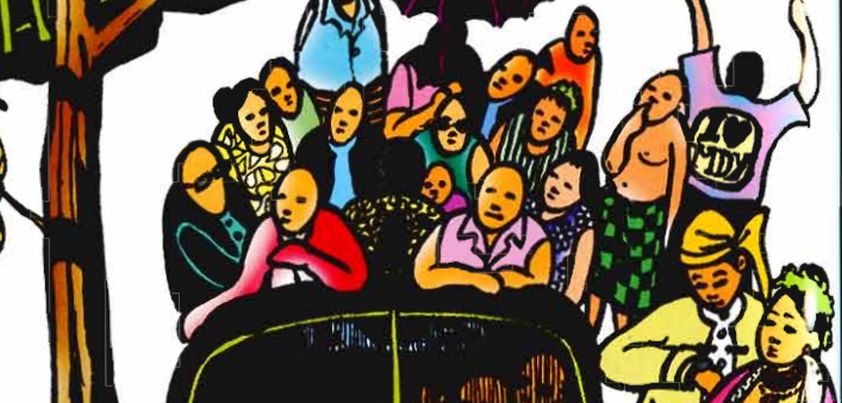 Major themes of this story by Nyi Pu Lay are tradition (realistically portraying aspects of a working-class Mandalay wedding), and caring and respect for the aged at both a family and community level. The groom’s father is seriously ill and his son, his new wife, and others (including the grumpy owner of the only TV in the neighborhood) go to great lengths to ensure that he has an enjoyable day. Other themes include family, friendship, community, and the wonder of adults and children alike experiencing “modern” technology for the first time (in this case a car ride and watching TV). More…
Major themes of this story by Nyi Pu Lay are tradition (realistically portraying aspects of a working-class Mandalay wedding), and caring and respect for the aged at both a family and community level. The groom’s father is seriously ill and his son, his new wife, and others (including the grumpy owner of the only TV in the neighborhood) go to great lengths to ensure that he has an enjoyable day. Other themes include family, friendship, community, and the wonder of adults and children alike experiencing “modern” technology for the first time (in this case a car ride and watching TV). More…
Shopping
 This story is about motherly love taken too far. Joyce Carol Oates uses a trip to the mall to explore the relationship between a lonely, divorced mother and her 17-year-old daughter. At one point, the mother wants to ask her daughter: Why are you unhappy? Why do you hate me? Later, the mother stares at her with hatred. The girl is blossoming into independent womanhood. She has been the sole focus of her mother’s life, and the mother is having trouble “letting go”. Themes include helicopter parenting, loneliness, alcoholism and identity. More…
This story is about motherly love taken too far. Joyce Carol Oates uses a trip to the mall to explore the relationship between a lonely, divorced mother and her 17-year-old daughter. At one point, the mother wants to ask her daughter: Why are you unhappy? Why do you hate me? Later, the mother stares at her with hatred. The girl is blossoming into independent womanhood. She has been the sole focus of her mother’s life, and the mother is having trouble “letting go”. Themes include helicopter parenting, loneliness, alcoholism and identity. More…
Dusky Ruth
 In addition to writing fantasy and horror stories, A. E. Coppard had a wonderful talent for describing nature and human nature through his tales of life and love in the English countryside. Here, a hiker exploring the Cotswolds stops for the night at a village inn. The only lodger, he shares passionate embraces with a dusky serving girl in a downstairs sitting room. Later that night, she invites him to her bedroom where, as she lays naked and crying beside him, he proves to be a perfect English gentleman. Themes include the beauty of nature, isolation, loneliness, sexuality, desire, restraint. More…
In addition to writing fantasy and horror stories, A. E. Coppard had a wonderful talent for describing nature and human nature through his tales of life and love in the English countryside. Here, a hiker exploring the Cotswolds stops for the night at a village inn. The only lodger, he shares passionate embraces with a dusky serving girl in a downstairs sitting room. Later that night, she invites him to her bedroom where, as she lays naked and crying beside him, he proves to be a perfect English gentleman. Themes include the beauty of nature, isolation, loneliness, sexuality, desire, restraint. More…
A Day Goes By
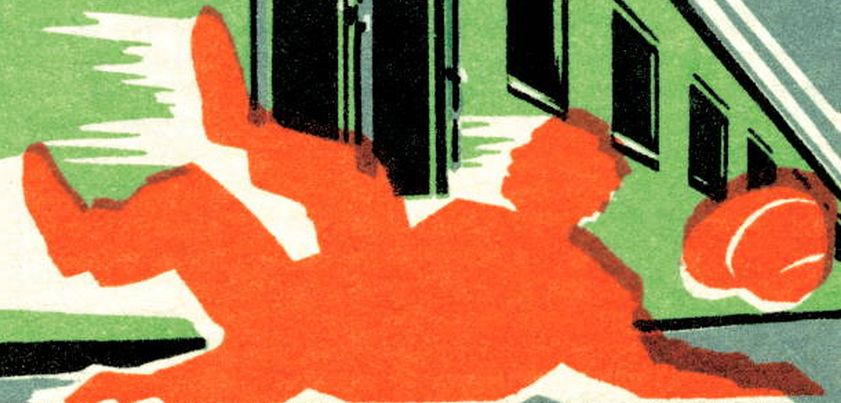 First time readers of this narrative from Luigi Pirandello may find it confusing until the last few paragraphs. The story is an allegory of life, contracted into a single day. The day begins as the disoriented protagonist is unceremoniously cast out of a train carriage into the dawn, and ends with him lying on his deathbed surrounded by his children and grandchildren. Themes include alienation (not knowing oneself, lack of self-confidence, exclusion); identity (what makes us who we are – clothes, occupation, recognition, money, possessions, family); and time (the speed at which life appears to have passed as we age). More…
First time readers of this narrative from Luigi Pirandello may find it confusing until the last few paragraphs. The story is an allegory of life, contracted into a single day. The day begins as the disoriented protagonist is unceremoniously cast out of a train carriage into the dawn, and ends with him lying on his deathbed surrounded by his children and grandchildren. Themes include alienation (not knowing oneself, lack of self-confidence, exclusion); identity (what makes us who we are – clothes, occupation, recognition, money, possessions, family); and time (the speed at which life appears to have passed as we age). More…
A Village After Dark
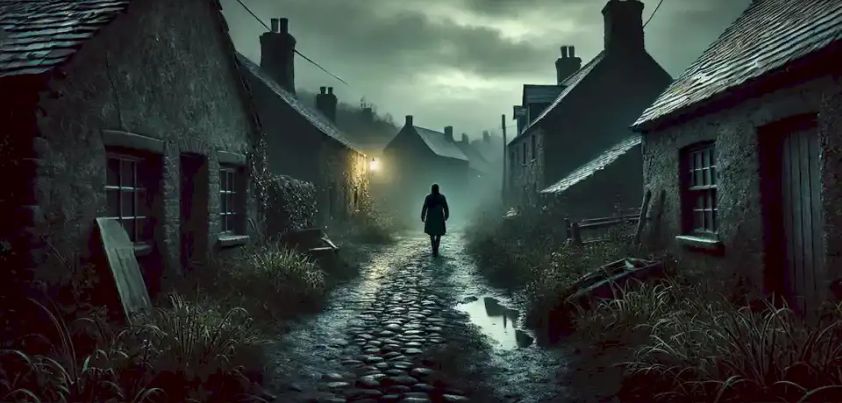 If you like a story where everything is neatly tied up at the end, this dream-like tale by Kazuo Ishiguro may not be for you. A filthy, feeble old man dressed in rags returns to a village in which he was a person of influence many years ago. His memory is failing, so the village feels somewhat alien. His purpose is to “make amends”, but we aren’t told what for, Older villagers are uneasy about his return, while to the younger generation he is a cult-like hero. Themes include identity, alienation, redemption, jealousy/ego, bullying, aging and the fragility of memory. More…
If you like a story where everything is neatly tied up at the end, this dream-like tale by Kazuo Ishiguro may not be for you. A filthy, feeble old man dressed in rags returns to a village in which he was a person of influence many years ago. His memory is failing, so the village feels somewhat alien. His purpose is to “make amends”, but we aren’t told what for, Older villagers are uneasy about his return, while to the younger generation he is a cult-like hero. Themes include identity, alienation, redemption, jealousy/ego, bullying, aging and the fragility of memory. More…
Escapes
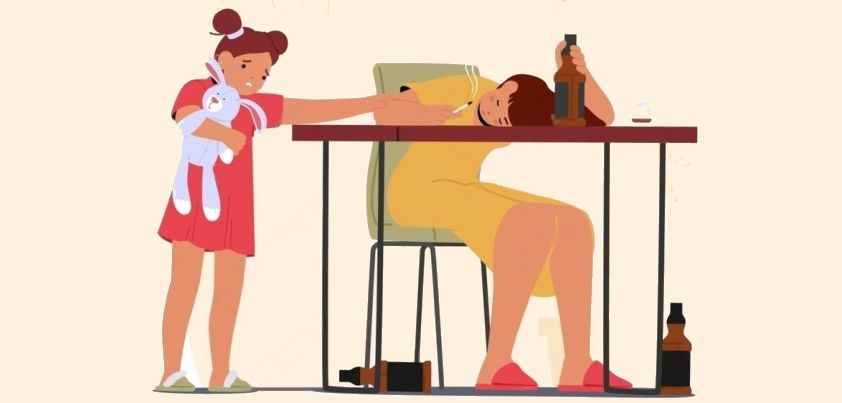 This disturbing story from Joy Williams deals with the difficulty of escaping addiction (in this case a mother’s alcohol abuse) and, for those close to you (her daughter), its consequences. The theme of escape runs throughout the story, from the mother’s escape of her demons through drinking, to the father leaving them, multiple references to the escape artist Houdini, a kindly theatre usher relating his escape from alcoholism, and the daughter’s strong desire to “get out of it”. Sadly, the mother’s escape (and perhaps her daughter’s) doesn’t come until her death. Other themes include alcohol abuse, abandonment, mother-daughter relationships. More…
This disturbing story from Joy Williams deals with the difficulty of escaping addiction (in this case a mother’s alcohol abuse) and, for those close to you (her daughter), its consequences. The theme of escape runs throughout the story, from the mother’s escape of her demons through drinking, to the father leaving them, multiple references to the escape artist Houdini, a kindly theatre usher relating his escape from alcoholism, and the daughter’s strong desire to “get out of it”. Sadly, the mother’s escape (and perhaps her daughter’s) doesn’t come until her death. Other themes include alcohol abuse, abandonment, mother-daughter relationships. More…
The Salt Inspector / Namak Ka Daroga
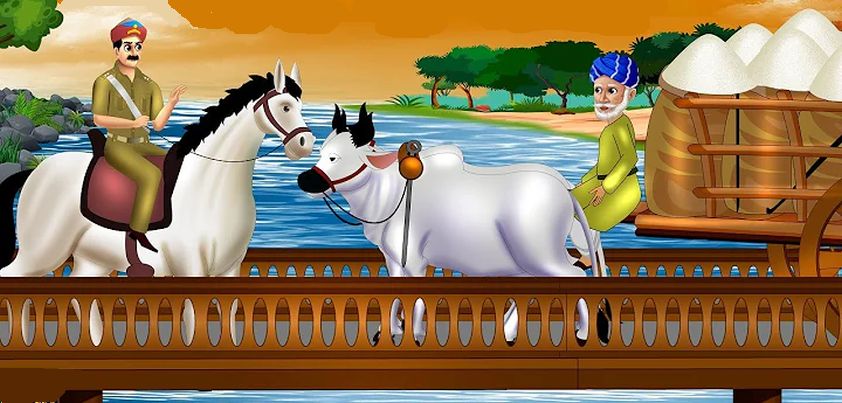 This parable by Premchand about an incorruptible Indian tax inspector ends with a moral dilemma. The idealistic young man refuses a huge bribe and arrests a wealthy zamindar (land baron) for smuggling salt. Because of his “connections”, the zamindar walks free and the inspector is suspended for being over-zealous. Shortly afterwards, the clever zamindar offers the young man a highly-paid job overseeing his properties. He seems happy to cheat the government, but needs someone honest to stop people cheating him. The young man’s dilemma: should he work for such a person? Themes include individual and systemic corruption, integrity, moral compromise. More…
This parable by Premchand about an incorruptible Indian tax inspector ends with a moral dilemma. The idealistic young man refuses a huge bribe and arrests a wealthy zamindar (land baron) for smuggling salt. Because of his “connections”, the zamindar walks free and the inspector is suspended for being over-zealous. Shortly afterwards, the clever zamindar offers the young man a highly-paid job overseeing his properties. He seems happy to cheat the government, but needs someone honest to stop people cheating him. The young man’s dilemma: should he work for such a person? Themes include individual and systemic corruption, integrity, moral compromise. More…
The Bride Comes to Yellow Sky
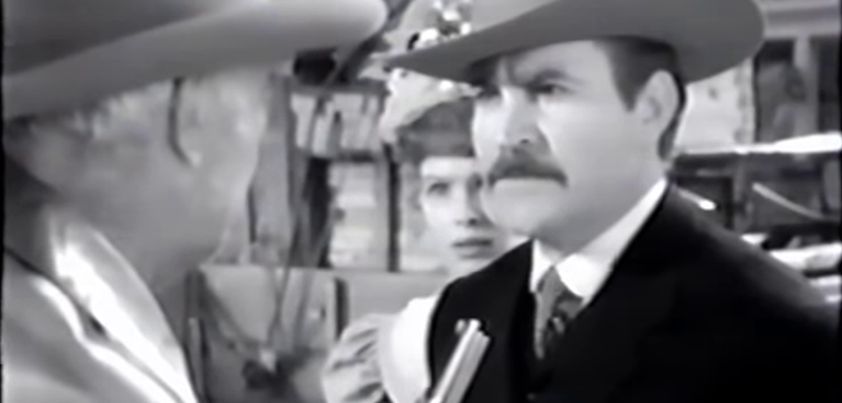 The major theme of this story from Stephen Crane is the taming of America’s ‘Wild West’. The instrument of change is the railroad, which brings ‘Eastern’ ways to previously isolated communities like Yellow Sky. The town’s Marshall, who returns from a city visit with a new wife, symbolizes the transition. As the couple approach their new home, where things will certainly be different for the Marshall, they are confronted by the town drunk spoiling for a fight. When the ‘showdown’ doesn’t go as the drunkard expects, he realizes the old days are gone forever. Other themes: community, marriage, fear, violence. More…
The major theme of this story from Stephen Crane is the taming of America’s ‘Wild West’. The instrument of change is the railroad, which brings ‘Eastern’ ways to previously isolated communities like Yellow Sky. The town’s Marshall, who returns from a city visit with a new wife, symbolizes the transition. As the couple approach their new home, where things will certainly be different for the Marshall, they are confronted by the town drunk spoiling for a fight. When the ‘showdown’ doesn’t go as the drunkard expects, he realizes the old days are gone forever. Other themes: community, marriage, fear, violence. More…
Cleansing Monday
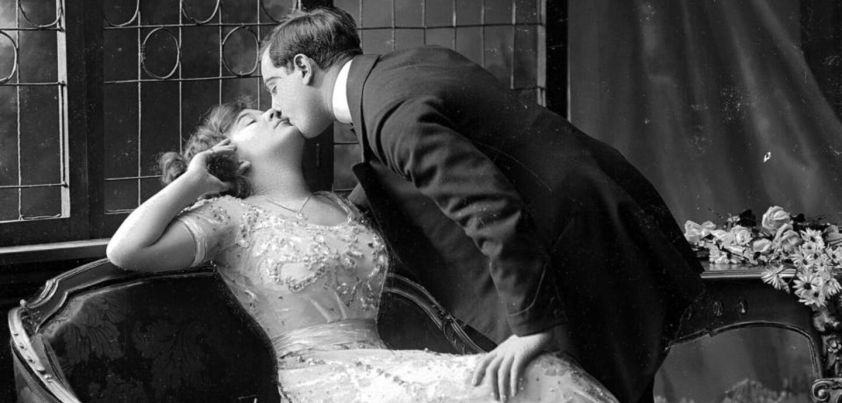 In this story by Ivan Bunin, a young Russian man suffers through a long, frustrating relationship with an enigmatic woman he is deeply in love with. She claims to have no interest in marrying and rejects all attempts at sexual contact. He endures, hoping she will change her mind. Although she is very religious, they smoke, drink and go to seedy taverns together. To his surprise, one Clean Monday (or rather the morning after) she gives herself to him. That evening, she leaves his life forever. Themes include love, frustration, loss, religious devotion, nostalgia (life in pre-revolutionary Moscow). More…
In this story by Ivan Bunin, a young Russian man suffers through a long, frustrating relationship with an enigmatic woman he is deeply in love with. She claims to have no interest in marrying and rejects all attempts at sexual contact. He endures, hoping she will change her mind. Although she is very religious, they smoke, drink and go to seedy taverns together. To his surprise, one Clean Monday (or rather the morning after) she gives herself to him. That evening, she leaves his life forever. Themes include love, frustration, loss, religious devotion, nostalgia (life in pre-revolutionary Moscow). More…
The Wall
 In this story by Jean-Paul Sartre, a foreign volunteer in the fight against Franco’s Nationalists during the Spanish Civil War is arrested. He and two other men are put in a cell where they learn they will be shot the following morning. Most of story is about how each deals with the prospect of death. After the other two are led away, the narrator is given a choice: to follow them or give up the location of a Republican leader. Themes include the brutality of war, death, existentialism (free will to determine the meaning and purpose of our life). More…
In this story by Jean-Paul Sartre, a foreign volunteer in the fight against Franco’s Nationalists during the Spanish Civil War is arrested. He and two other men are put in a cell where they learn they will be shot the following morning. Most of story is about how each deals with the prospect of death. After the other two are led away, the narrator is given a choice: to follow them or give up the location of a Republican leader. Themes include the brutality of war, death, existentialism (free will to determine the meaning and purpose of our life). More…
The Last Question
 In commenting on this story, Isaac Asimov once wrote: This is by far my favorite story of all those I have written. After all, I undertook to tell several trillion years of human history in the space of a short story…. I also undertook another task, but I won’t tell you what that was lest I spoil the story for you. Although there is very little character development or action, the ending is so powerful that almost everyone who reads it remembers it. Themes include technological change, the search for knowledge, entropy and the fate of mankind, religion (omniscience, creation). More…
In commenting on this story, Isaac Asimov once wrote: This is by far my favorite story of all those I have written. After all, I undertook to tell several trillion years of human history in the space of a short story…. I also undertook another task, but I won’t tell you what that was lest I spoil the story for you. Although there is very little character development or action, the ending is so powerful that almost everyone who reads it remembers it. Themes include technological change, the search for knowledge, entropy and the fate of mankind, religion (omniscience, creation). More…
My Life with the Wave
 In this surrealist prose poem by Octavio Paz, a man at a beach is seduced by a sensuous ocean wave. The wave insists on following him home, where they begin a passionate love affair. The wave is subject to sudden mood swings and, to make sure she is not lonely, he buys a colony of fish to swim in her waters. The attention she and the fish give each other leads to jealousy and hatred on his part, and an icy end for the hapless wave. Themes include freedom and oppression, love and passion, jealousy, fear and hatred. More…
In this surrealist prose poem by Octavio Paz, a man at a beach is seduced by a sensuous ocean wave. The wave insists on following him home, where they begin a passionate love affair. The wave is subject to sudden mood swings and, to make sure she is not lonely, he buys a colony of fish to swim in her waters. The attention she and the fish give each other leads to jealousy and hatred on his part, and an icy end for the hapless wave. Themes include freedom and oppression, love and passion, jealousy, fear and hatred. More…
The Kimono
 In this story by H. E. Bates a fifty-year-old man looks back on his life from the day, shortly before his marriage, he had an unexpected sexual encounter with a seductive woman in an orange and green kimono. Three weeks later, he left his new bride and moved in with the other woman. So began twenty-five years of bliss and heart-ache as it became clear that, despite their strong feelings for each other, his free-spirited partner could never be happy in the arms of just one man. Themes include female sexuality, desire, passion, infidelity, choices and consequences, regret. More…
In this story by H. E. Bates a fifty-year-old man looks back on his life from the day, shortly before his marriage, he had an unexpected sexual encounter with a seductive woman in an orange and green kimono. Three weeks later, he left his new bride and moved in with the other woman. So began twenty-five years of bliss and heart-ache as it became clear that, despite their strong feelings for each other, his free-spirited partner could never be happy in the arms of just one man. Themes include female sexuality, desire, passion, infidelity, choices and consequences, regret. More…
The Stout Gentleman
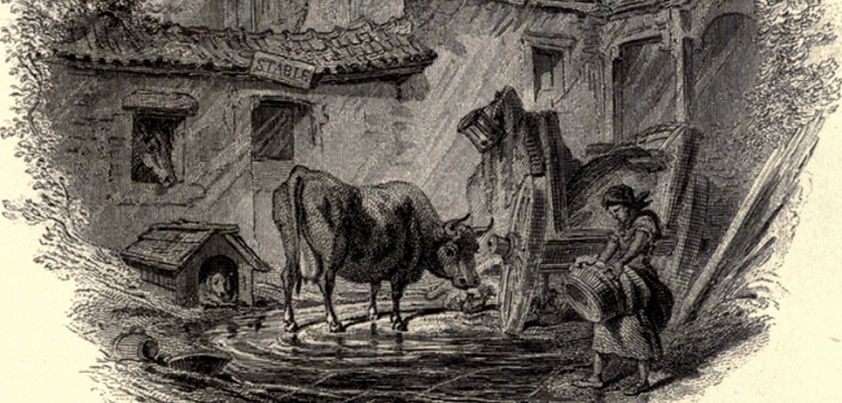 The major theme of this humorous story by Washington Irving is the extent to which we rely on appearance to judge others. A traveller staying at an inn is forced to remain indoors on a miserable, rainy Sunday. With nothing to do and no one to talk to, he passes the time by speculating as to the profession and social status of the only other guest, a demanding, seemingly sophisticated man who remains in his room all day. We learn little more about the other man, who the staff refer to only as the stout gentleman. Other themes: curiosity, obsession, identity. More…
The major theme of this humorous story by Washington Irving is the extent to which we rely on appearance to judge others. A traveller staying at an inn is forced to remain indoors on a miserable, rainy Sunday. With nothing to do and no one to talk to, he passes the time by speculating as to the profession and social status of the only other guest, a demanding, seemingly sophisticated man who remains in his room all day. We learn little more about the other man, who the staff refer to only as the stout gentleman. Other themes: curiosity, obsession, identity. More…
Shiloh
 In the same way that Shiloh Military Park is the site of a major turning point in the American Civil War, the couple in this story by Bobby Ann Mason face several turning points of their own. The first, always lingering in the background and never spoken of, is the death of their infant son. Later comes an accident that forces the truck-driver husband to give up his job, and an identity crisis that results in his wife seeking a new beginning in life. Themes: loss, guilt, avoidance, individual and community change, marriage, gender roles, self-discovery/fulfillment, independence. More…
In the same way that Shiloh Military Park is the site of a major turning point in the American Civil War, the couple in this story by Bobby Ann Mason face several turning points of their own. The first, always lingering in the background and never spoken of, is the death of their infant son. Later comes an accident that forces the truck-driver husband to give up his job, and an identity crisis that results in his wife seeking a new beginning in life. Themes: loss, guilt, avoidance, individual and community change, marriage, gender roles, self-discovery/fulfillment, independence. More…
Ashes for the Wind
 In this story by Hernando Téllez, a corrupt mayor and police in an unnamed town, aided by a local informer, are systematically expelling (and presumably taking over the land of) residents who voted against the incumbent government in recent elections. A man and his wife courageously, or foolishly depending on how you look at it, resist. When the authorities come to evict them, they lock their doors and windows… only to be burnt alive after the police torch their house. Themes include power and control, corruption, betrayal, brutality, courage and sacrifice, choices and consequences. More…
In this story by Hernando Téllez, a corrupt mayor and police in an unnamed town, aided by a local informer, are systematically expelling (and presumably taking over the land of) residents who voted against the incumbent government in recent elections. A man and his wife courageously, or foolishly depending on how you look at it, resist. When the authorities come to evict them, they lock their doors and windows… only to be burnt alive after the police torch their house. Themes include power and control, corruption, betrayal, brutality, courage and sacrifice, choices and consequences. More…
The Boogeyman
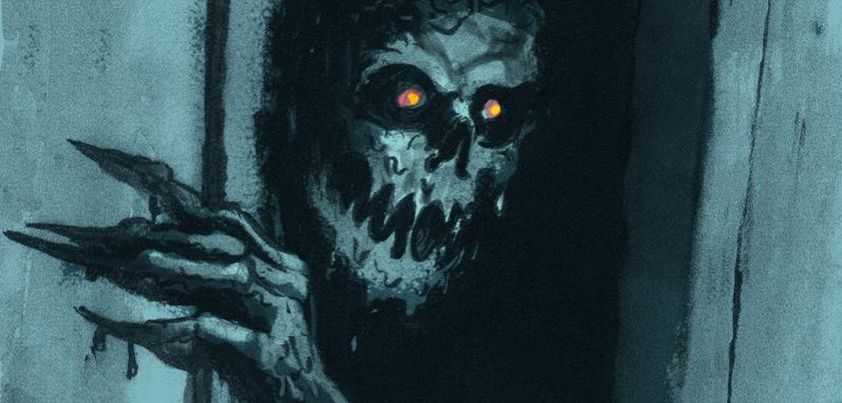 This story by Stephen King explores one of the greatest fears of many young children as they go to bed: the fact that some sort of evil creature may be hiding under their bed, behind the curtains, or in their closet. In the story, a man with serious mental problems blames himself for the death of his three children. He thinks a monster from his childhood killed them, and that it is now coming after him. Readers are left to wonder who or what this boogeyman really is. Themes include fear, imagination, paranoia, mental illness, filicide, guilt. More…
This story by Stephen King explores one of the greatest fears of many young children as they go to bed: the fact that some sort of evil creature may be hiding under their bed, behind the curtains, or in their closet. In the story, a man with serious mental problems blames himself for the death of his three children. He thinks a monster from his childhood killed them, and that it is now coming after him. Readers are left to wonder who or what this boogeyman really is. Themes include fear, imagination, paranoia, mental illness, filicide, guilt. More…
Railroad Standard Time
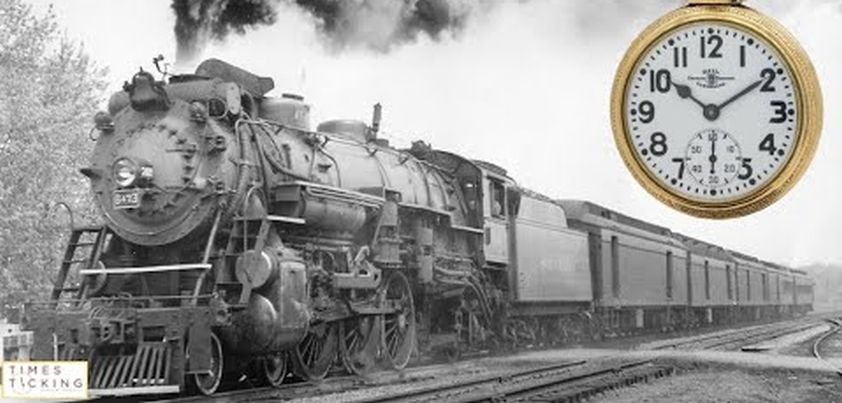 Major themes of this semi-autobiographical story by Frank Chin are time (symbolized by an inherited pocket watch that keeps Railroad Standard Time), the clash between traditional Chinese and ‘modern’ American culture, and the need to move away from long-held stereotypes of Chinese-American men and women. Ironically for a story that focuses on time, the plot does not proceed linearly. As the narrator drives to and from his mother’s funeral, the story moves from memories of the past to the present and then back again, with the watch providing a connection between them. Other themes: nostalgia, family, cultural heritage, identity, masculinity. More…
Major themes of this semi-autobiographical story by Frank Chin are time (symbolized by an inherited pocket watch that keeps Railroad Standard Time), the clash between traditional Chinese and ‘modern’ American culture, and the need to move away from long-held stereotypes of Chinese-American men and women. Ironically for a story that focuses on time, the plot does not proceed linearly. As the narrator drives to and from his mother’s funeral, the story moves from memories of the past to the present and then back again, with the watch providing a connection between them. Other themes: nostalgia, family, cultural heritage, identity, masculinity. More…
This Blessed House
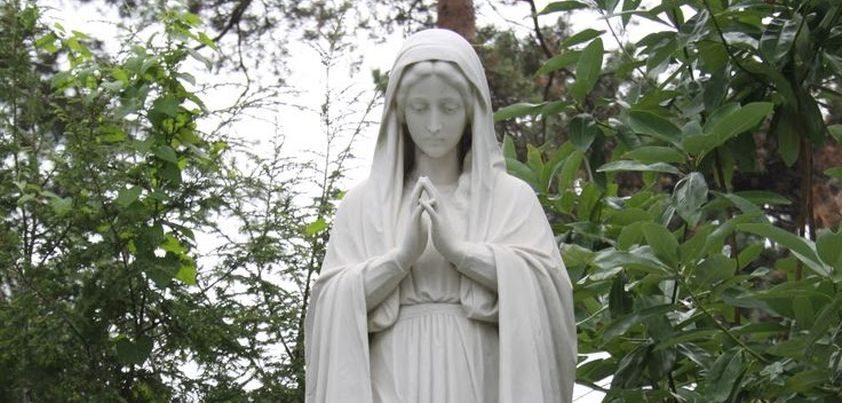 The major theme of this Jhumpa Lahiri story is the personality clashes that can arise in hasty or arranged marriages. Sanjeev is a conservative, up-and-coming corporate engineer. “Twinkle”, his free-spirited, scatty wife is completing her master’s thesis in poetry. They have known each other for only four months, and both are used to getting their own way. A battle of wills arises over the fate of several Christian items left by the former occupants of their new house. The key questions: Who will win, and will the marriage survive? Other themes: love, cultural adjustment (male dominance vs. shared decision-making), understanding/tolerance. More…
The major theme of this Jhumpa Lahiri story is the personality clashes that can arise in hasty or arranged marriages. Sanjeev is a conservative, up-and-coming corporate engineer. “Twinkle”, his free-spirited, scatty wife is completing her master’s thesis in poetry. They have known each other for only four months, and both are used to getting their own way. A battle of wills arises over the fate of several Christian items left by the former occupants of their new house. The key questions: Who will win, and will the marriage survive? Other themes: love, cultural adjustment (male dominance vs. shared decision-making), understanding/tolerance. More…
The Whimper of Whipped Dogs
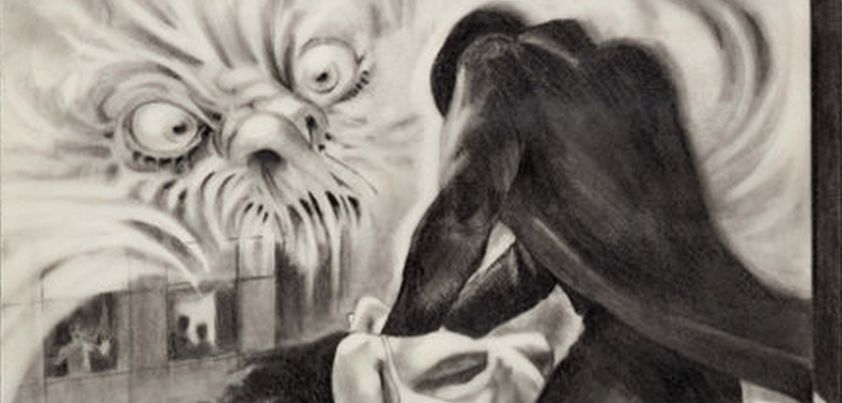 This horror story from Harlan Ellison uses magical realism to explain a crime: the 1964 murder of Kitty Genovese. Newspapers at the time (incorrectly) reported that 38 people, none of whom did anything to help, witnessed her stabbing. Here, a witness to a particularly brutal murder senses an evil presence. She later learns that it was a form of black mass, and joins the demonic cult as a means of survival. Themes include negative aspects of city life (competitive pressure, lack of connection, loneliness), behavioral effects of city life (depression, insensitivity, anger, rudeness, aggression, violence), supernatural (demonic) forces, and cultism. More…
This horror story from Harlan Ellison uses magical realism to explain a crime: the 1964 murder of Kitty Genovese. Newspapers at the time (incorrectly) reported that 38 people, none of whom did anything to help, witnessed her stabbing. Here, a witness to a particularly brutal murder senses an evil presence. She later learns that it was a form of black mass, and joins the demonic cult as a means of survival. Themes include negative aspects of city life (competitive pressure, lack of connection, loneliness), behavioral effects of city life (depression, insensitivity, anger, rudeness, aggression, violence), supernatural (demonic) forces, and cultism. More…
Six Feet of the Country
 This early apartheid-era story by Nadine Gordimer highlights the white South African bureaucracy’s callousness and cultural insensitivity towards other races. While city-dwelling whites live in fear, the unnamed protagonist and his wife peacefully co-exist with their black farm workers on a small property just out of town. When the visiting brother of one of their workers dies, the authorities take the body away for autopsy. After paying £20 to have it returned for burial, they find a different body in the coffin. Major themes: racism and inequality (even in death!), change. More…
This early apartheid-era story by Nadine Gordimer highlights the white South African bureaucracy’s callousness and cultural insensitivity towards other races. While city-dwelling whites live in fear, the unnamed protagonist and his wife peacefully co-exist with their black farm workers on a small property just out of town. When the visiting brother of one of their workers dies, the authorities take the body away for autopsy. After paying £20 to have it returned for burial, they find a different body in the coffin. Major themes: racism and inequality (even in death!), change. More…
The Other
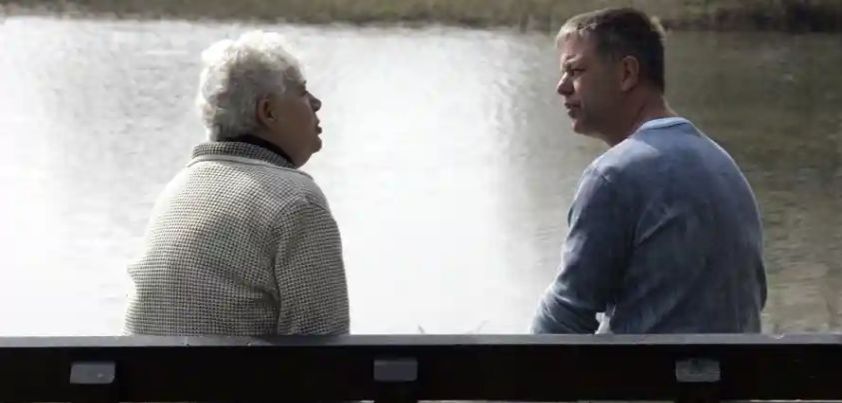 In this story by Jorge Borges, a younger man sits beside an aging teacher sitting on a riverside bench. As they talk, the teacher realizes that the younger man is himself at an earlier age. An ‘impossible’ date on an American banknote convinces the skeptical young man this is true. The teacher concludes that while the meeting was real and he definitely took part in it, the younger man wasn’t really there… he was dreaming the encounter! This begs the question, Could it have been the other way around? Themes include human existence, time, memory, dreams, old age, relativism. More…
In this story by Jorge Borges, a younger man sits beside an aging teacher sitting on a riverside bench. As they talk, the teacher realizes that the younger man is himself at an earlier age. An ‘impossible’ date on an American banknote convinces the skeptical young man this is true. The teacher concludes that while the meeting was real and he definitely took part in it, the younger man wasn’t really there… he was dreaming the encounter! This begs the question, Could it have been the other way around? Themes include human existence, time, memory, dreams, old age, relativism. More…
All You Zombies
 Despite the title, this fascinating story from science fiction writer Robert Heinlein has nothing to do with zombies of the “walking dead” kind. Rather, it is a cleverly constructed brainteaser that explores some potential problems and paradoxes of time-travel. We can’t say more without spoiling the story, but can tell you that first time readers usually come away with their heads spinning from trying to work out “who is who” and “who did what to whom”. If you are similarly confused, Wikipedia has an excellent summary of the relationships and sequence of events here. Themes: time-travel, intersexuality, isolation. More…
Despite the title, this fascinating story from science fiction writer Robert Heinlein has nothing to do with zombies of the “walking dead” kind. Rather, it is a cleverly constructed brainteaser that explores some potential problems and paradoxes of time-travel. We can’t say more without spoiling the story, but can tell you that first time readers usually come away with their heads spinning from trying to work out “who is who” and “who did what to whom”. If you are similarly confused, Wikipedia has an excellent summary of the relationships and sequence of events here. Themes: time-travel, intersexuality, isolation. More…
Trick or Treat
 In this disturbing story by Padgett Powell a bored, frustrated housewife is approached by a twelve-year-old boy intent on exploring his sexuality. Notwithstanding the fact that the woman, who frequently walks past the boy’s house, is old enough to be his mother, he is fixated on having sex with her. The woman, who had sought relief from her unsatisfying marriage before, compares the tryst and the prospect of some comical but not ungratifying sex with the boy to Orpheus’ ascent from the underworld. Themes include boredom and dissatisfaction, escape, sexuality, desire, machismo, illicit relationships/child grooming. More…
In this disturbing story by Padgett Powell a bored, frustrated housewife is approached by a twelve-year-old boy intent on exploring his sexuality. Notwithstanding the fact that the woman, who frequently walks past the boy’s house, is old enough to be his mother, he is fixated on having sex with her. The woman, who had sought relief from her unsatisfying marriage before, compares the tryst and the prospect of some comical but not ungratifying sex with the boy to Orpheus’ ascent from the underworld. Themes include boredom and dissatisfaction, escape, sexuality, desire, machismo, illicit relationships/child grooming. More…
The Egg
 This dark comedy from Sherwood Anderson follows a contented farmhand and his ambitious wife who, after starting a family, decide to pursue the American Dream. In their first venture, a chicken farm, everything that can go wrong does go wrong. More troubles follow when they move closer to town and open a diner. The stressed husband tries to help business by being someone he is not (an entertainer), and ends up “with egg on his face”. The egg, which usually symbolizes the cycle of life, is for them a symbol of the cycle of poverty. Other themes: death, isolation, hope. More…
This dark comedy from Sherwood Anderson follows a contented farmhand and his ambitious wife who, after starting a family, decide to pursue the American Dream. In their first venture, a chicken farm, everything that can go wrong does go wrong. More troubles follow when they move closer to town and open a diner. The stressed husband tries to help business by being someone he is not (an entertainer), and ends up “with egg on his face”. The egg, which usually symbolizes the cycle of life, is for them a symbol of the cycle of poverty. Other themes: death, isolation, hope. More…
Kabuliwallah
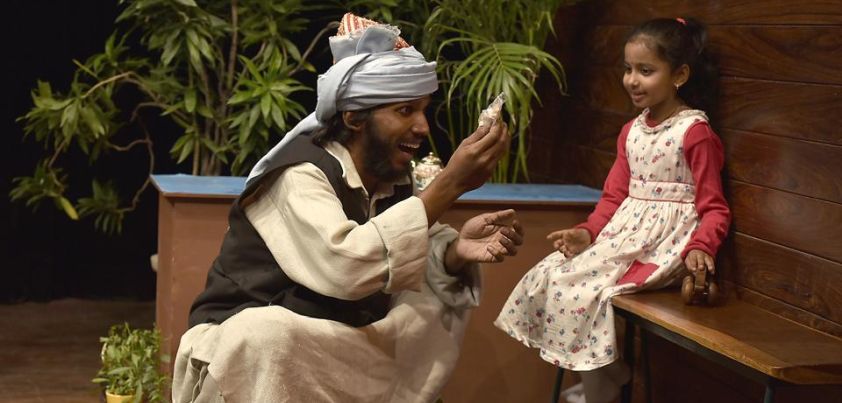 If you are a parent, this touching story by Rabindranath Tagore may well bring a tear to your eye. One of Tagore’s most popular stories, it describes an unlikely friendship between the precocious five-year-old daughter of a middle-class Bengali writer and an Afghani fruit-seller (Kabuliwallah). When the Kabuliwallah visits on the girl’s wedding day after an eight-year stint in prison, she barely acknowledges him. On learning why the fruit-seller had spent so much time with his daughter, the writer and Kabuliwallah form an instant bond. Themes: childhood innocence, friendship, growing up, change, class, prejudice, fatherly love. More…
If you are a parent, this touching story by Rabindranath Tagore may well bring a tear to your eye. One of Tagore’s most popular stories, it describes an unlikely friendship between the precocious five-year-old daughter of a middle-class Bengali writer and an Afghani fruit-seller (Kabuliwallah). When the Kabuliwallah visits on the girl’s wedding day after an eight-year stint in prison, she barely acknowledges him. On learning why the fruit-seller had spent so much time with his daughter, the writer and Kabuliwallah form an instant bond. Themes: childhood innocence, friendship, growing up, change, class, prejudice, fatherly love. More…
Bread of Sacrifice
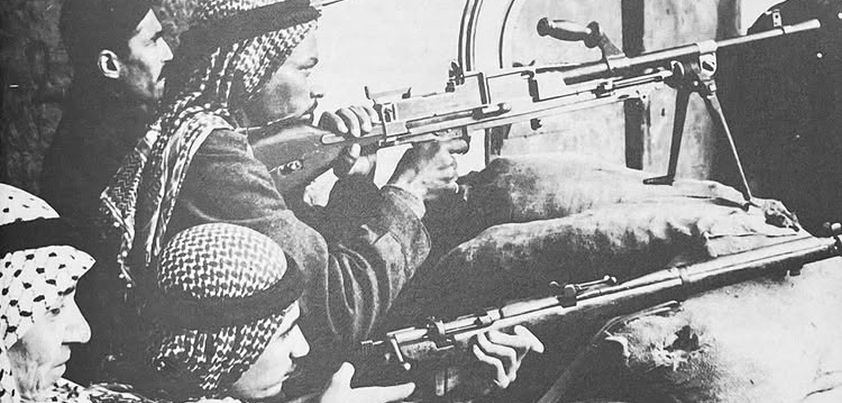 Set during the 1947-1948 civil war in Mandatory Palestine, this story by Samira Azzam describes a tragic romance between a Palestinian fighter defending the city of Acre and a young nurse who elected to remain after her family had fled. Both are idealistic and prepared to die out of love for their homeland. The girl is shot delivering a basket of bread to the starving men on the soldier’s roof-top barricade. The men face a dilemma… eat something prohibited under Islamic law (a dead dog), or bread soaked in the martyred woman’s blood. Themes include love, patriotism, courage, death. More…
Set during the 1947-1948 civil war in Mandatory Palestine, this story by Samira Azzam describes a tragic romance between a Palestinian fighter defending the city of Acre and a young nurse who elected to remain after her family had fled. Both are idealistic and prepared to die out of love for their homeland. The girl is shot delivering a basket of bread to the starving men on the soldier’s roof-top barricade. The men face a dilemma… eat something prohibited under Islamic law (a dead dog), or bread soaked in the martyred woman’s blood. Themes include love, patriotism, courage, death. More…
The Golden Kite, the Silver Wind
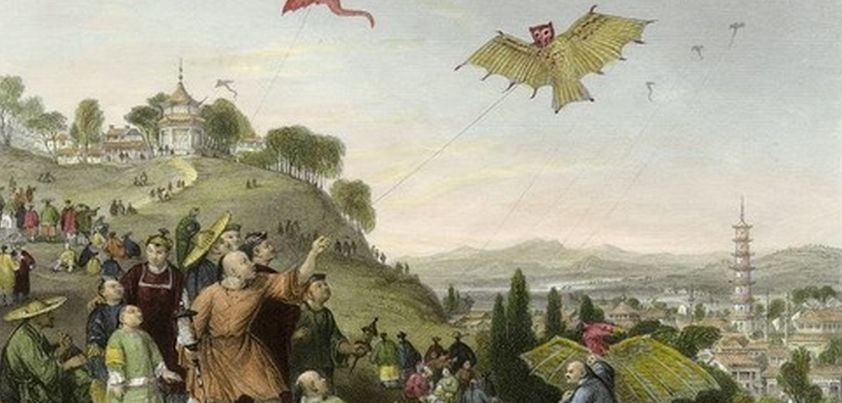 This Ray Bradbury story is thought to be an allegory of the nuclear arms race that took place during the “Cold War” between the United States and Russia. The “Mandarins” who began the Cold War were Harry S. Truman and Joseph Stalin. One wonders if the first Mandarin’s daughter alludes to Truman’s wife Bess, who he claims to have consulted before every important decision. Moreover, Bess is known to have made changes to his famous speech outlining the Truman Doctrine, which started it all. Themes include rivalry, paranoia, wisdom, the futility of confrontation and escalation vs. the benefits of cooperation. More…
This Ray Bradbury story is thought to be an allegory of the nuclear arms race that took place during the “Cold War” between the United States and Russia. The “Mandarins” who began the Cold War were Harry S. Truman and Joseph Stalin. One wonders if the first Mandarin’s daughter alludes to Truman’s wife Bess, who he claims to have consulted before every important decision. Moreover, Bess is known to have made changes to his famous speech outlining the Truman Doctrine, which started it all. Themes include rivalry, paranoia, wisdom, the futility of confrontation and escalation vs. the benefits of cooperation. More…
The Demon Lover
 In this horror story by Elizabeth Bowen, a woman returns to her large, war-damaged city house to collect personal items. The house had been locked up, nobody knew she was coming, yet there is a letter addressed to her sitting on a table. It had been hand delivered earlier that day and is an anniversary greeting ending with the words: You may expect me at the hour arranged. Someone (possibly the spirit of a former soldier-lover) may be in the house or coming for her. Themes include the trauma of war, gender stereotypes, doubt, imagination and fear, betrayal and revenge. More…
In this horror story by Elizabeth Bowen, a woman returns to her large, war-damaged city house to collect personal items. The house had been locked up, nobody knew she was coming, yet there is a letter addressed to her sitting on a table. It had been hand delivered earlier that day and is an anniversary greeting ending with the words: You may expect me at the hour arranged. Someone (possibly the spirit of a former soldier-lover) may be in the house or coming for her. Themes include the trauma of war, gender stereotypes, doubt, imagination and fear, betrayal and revenge. More…
Think of England
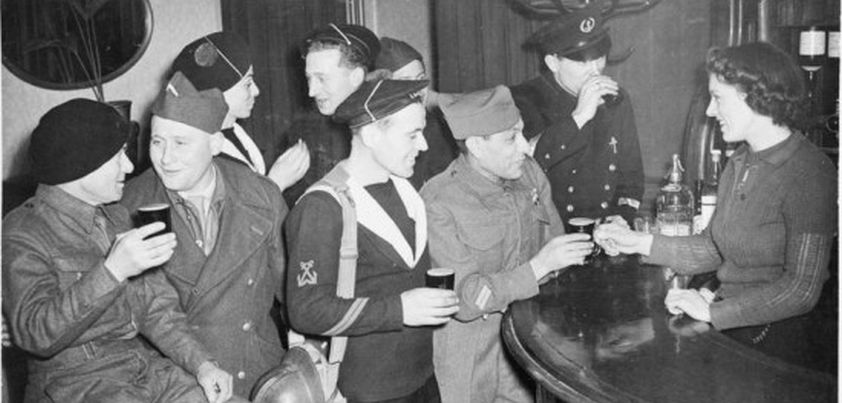 In this coming of age story by Peter Ho Davies, a sixteen-year-old Welsh barmaid will always remember D-day. Her section of the pub is full of English soldiers and BBC radio workers who are celebrating and drinking heavily. First, she has to put up with offensive jokes from a BBC comedian about the Welsh, and in particular Welsh women. Later, her secret “sweetheart” (an English soldier she has known for a only week, and with whom she has exchanged her first ‘real’ kisses), tries to rape her. Themes include national pride and identity, xenophobia, sexual assault, redemption. More…
In this coming of age story by Peter Ho Davies, a sixteen-year-old Welsh barmaid will always remember D-day. Her section of the pub is full of English soldiers and BBC radio workers who are celebrating and drinking heavily. First, she has to put up with offensive jokes from a BBC comedian about the Welsh, and in particular Welsh women. Later, her secret “sweetheart” (an English soldier she has known for a only week, and with whom she has exchanged her first ‘real’ kisses), tries to rape her. Themes include national pride and identity, xenophobia, sexual assault, redemption. More…
Vanka
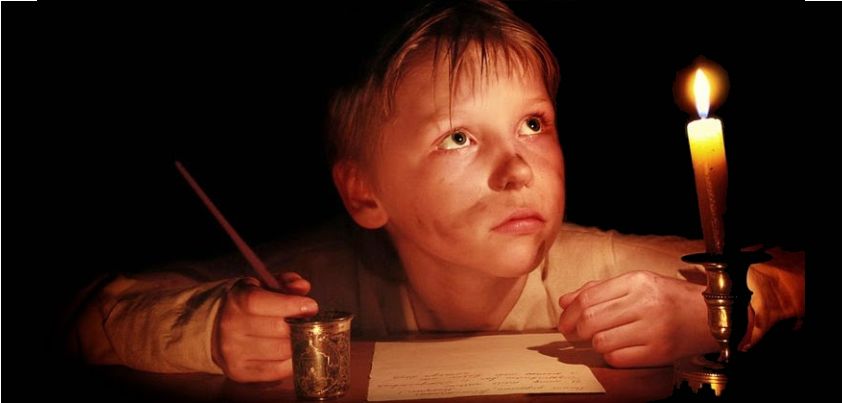 This poignant Christmas story by Anton Chekhov relates how a young boy recently apprenticed to a shoemaker writes a letter to his grandfather pleading to be taken home. He complains of continually being beaten and mistreated, and has no one to turn to for comfort. The city and its ways are foreign to him, and he misses the Christmas preparations and season’s joy in his home village. Sadly, his incompletely addressed letter will never reach its destination. Themes include social class, child-family separation, child abuse, innocence, loneliness, misery, desperation and hope. More…
This poignant Christmas story by Anton Chekhov relates how a young boy recently apprenticed to a shoemaker writes a letter to his grandfather pleading to be taken home. He complains of continually being beaten and mistreated, and has no one to turn to for comfort. The city and its ways are foreign to him, and he misses the Christmas preparations and season’s joy in his home village. Sadly, his incompletely addressed letter will never reach its destination. Themes include social class, child-family separation, child abuse, innocence, loneliness, misery, desperation and hope. More…
Poison
 Roald Dahl is best known for short stories that make their point using dark humor and have a surprise ending. This story exhibits neither of these features. The central theme is the racism that existed under British colonial rule. Dahl gets the message across through this allegory about the way a British businessman acted badly towards an Indian doctor who answered his call for help in the middle of the night and may well have saved his life. In the story we learn that there are several kinds of poison. Unlike the deadly krait, some of them kill quite slowly. More…
Roald Dahl is best known for short stories that make their point using dark humor and have a surprise ending. This story exhibits neither of these features. The central theme is the racism that existed under British colonial rule. Dahl gets the message across through this allegory about the way a British businessman acted badly towards an Indian doctor who answered his call for help in the middle of the night and may well have saved his life. In the story we learn that there are several kinds of poison. Unlike the deadly krait, some of them kill quite slowly. More…
Only the Dead Know Brooklyn
 New arrivals in a city often learn things and visit places that long-term residents don’t know about. In this humorous story from Thomas Wolfe, a stranger demonstrates this to the annoyance of the well-meaning but increasingly agitated narrator. The highly opinionated men differ over the narrator’s warnings about the dangers of the “nice sounding” Brooklyn neighborhoods the stranger has chosen for his nightly walks. To make matters worse, the stranger insists that all one needs to feel safe and get to “know” the city is a good map. Themes: connection, pride, perception, fear, curiosity. More…
New arrivals in a city often learn things and visit places that long-term residents don’t know about. In this humorous story from Thomas Wolfe, a stranger demonstrates this to the annoyance of the well-meaning but increasingly agitated narrator. The highly opinionated men differ over the narrator’s warnings about the dangers of the “nice sounding” Brooklyn neighborhoods the stranger has chosen for his nightly walks. To make matters worse, the stranger insists that all one needs to feel safe and get to “know” the city is a good map. Themes: connection, pride, perception, fear, curiosity. More…
Janus
 Ann Beattie’s Janus is about a realtor (Andrea) who strategically places her most prized possession (a decorative, “lucky” bowl) in houses she is showing in the belief it will help them sell. The titular Janus is the two-faced Roman god of duality; the lover who gave Andrea the bowl calls her “two-faced” for not leaving her husband. The central theme, symbolized by the bowl, is the choices modern women must make, as between career and family, financial security and struggle, husband and lover, etc. Andrea’s choices bring career and financial success, but not happiness. Other themes: aesthetic appreciation, deception, emptiness. More…
Ann Beattie’s Janus is about a realtor (Andrea) who strategically places her most prized possession (a decorative, “lucky” bowl) in houses she is showing in the belief it will help them sell. The titular Janus is the two-faced Roman god of duality; the lover who gave Andrea the bowl calls her “two-faced” for not leaving her husband. The central theme, symbolized by the bowl, is the choices modern women must make, as between career and family, financial security and struggle, husband and lover, etc. Andrea’s choices bring career and financial success, but not happiness. Other themes: aesthetic appreciation, deception, emptiness. More…
A Hunger Artist
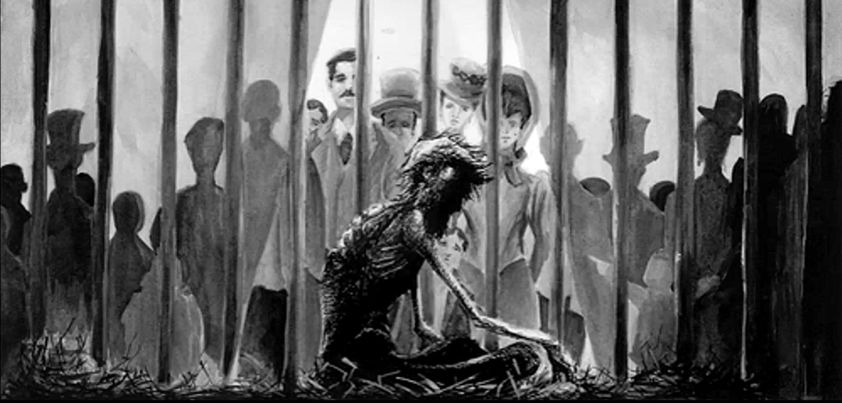 Themes of Franz Kafka’s A Hunger Artist include alienation and isolation, spiritual emptiness, art, voyeurism, exploitation, change and suffering. The unnamed artist does not hunger for food, but rather artistic recognition and spiritual fulfillment. When, as often happens, public tastes change, he has outlived his usefulness and is quickly forgotten. The story has variously been described as an allegory of the suffering of artists for the sake of their art, a metaphorical representation of the life of Jesus, and a reflection of the tortured final years of Kafka’s own life as an alienated artist dying from tuberculosis. More…
Themes of Franz Kafka’s A Hunger Artist include alienation and isolation, spiritual emptiness, art, voyeurism, exploitation, change and suffering. The unnamed artist does not hunger for food, but rather artistic recognition and spiritual fulfillment. When, as often happens, public tastes change, he has outlived his usefulness and is quickly forgotten. The story has variously been described as an allegory of the suffering of artists for the sake of their art, a metaphorical representation of the life of Jesus, and a reflection of the tortured final years of Kafka’s own life as an alienated artist dying from tuberculosis. More…
The Subliminal Man
 This 1963 story from J. G. Ballard envisions a dystopian future where people’s lives are conditioned by subliminal messages disseminated through advertising billboards and the mass media. The hidden messages, which appear to be officially sanctioned ‘to stimulate the economy’, compel people to buy things they don’t need or replace perfectly good recent purchases. Ominously, the major products involved are linked to powerful monopolies. The story is a biting satire of (then) modern advertising and its contribution to the post-war consumerism and rising household debt levels of the 1950s. Themes: conspiracy, technology, advertising, consumerism, debt, dehumanization (loss of free will). More…
This 1963 story from J. G. Ballard envisions a dystopian future where people’s lives are conditioned by subliminal messages disseminated through advertising billboards and the mass media. The hidden messages, which appear to be officially sanctioned ‘to stimulate the economy’, compel people to buy things they don’t need or replace perfectly good recent purchases. Ominously, the major products involved are linked to powerful monopolies. The story is a biting satire of (then) modern advertising and its contribution to the post-war consumerism and rising household debt levels of the 1950s. Themes: conspiracy, technology, advertising, consumerism, debt, dehumanization (loss of free will). More…
That in Aleppo Once…
 The title of this Vladimir Nabokov story is an allusion to Shakespeare’s Othello. Several characters reflect those in the famous play, and it shares the same major theme (jealousy). The story is more than the tale of a deceitful, adulterous wife who may have only married the older narrator to escape the German occupation. The narrator’s heartbreak has caused him to question not only his wife’s existence, but also whether life is worth living. His letter is an attempt to unburden himself, and create some hope for the future. Other themes: escape, betrayal, deception, uncertainty, suicide (implied by the title). More…
The title of this Vladimir Nabokov story is an allusion to Shakespeare’s Othello. Several characters reflect those in the famous play, and it shares the same major theme (jealousy). The story is more than the tale of a deceitful, adulterous wife who may have only married the older narrator to escape the German occupation. The narrator’s heartbreak has caused him to question not only his wife’s existence, but also whether life is worth living. His letter is an attempt to unburden himself, and create some hope for the future. Other themes: escape, betrayal, deception, uncertainty, suicide (implied by the title). More…
The Time Machine
 In this story by Dino Buzzati, a scientist builds a luxurious walled city in which a machine slows down time. Animals and plants grow and age half as quickly as those outside, allowing occupants to live for two centuries. Residency is expensive and, once inside, it is impossible to leave as the effects of normal time will be fatal. Life in the city proves not to be the utopia residents expected, and ends in disaster when something happens to the machine. Themes include self-preservation, alienation, monotony, the dangers of relying on technology and toying with the basic laws of nature. More…
In this story by Dino Buzzati, a scientist builds a luxurious walled city in which a machine slows down time. Animals and plants grow and age half as quickly as those outside, allowing occupants to live for two centuries. Residency is expensive and, once inside, it is impossible to leave as the effects of normal time will be fatal. Life in the city proves not to be the utopia residents expected, and ends in disaster when something happens to the machine. Themes include self-preservation, alienation, monotony, the dangers of relying on technology and toying with the basic laws of nature. More…
The Fly
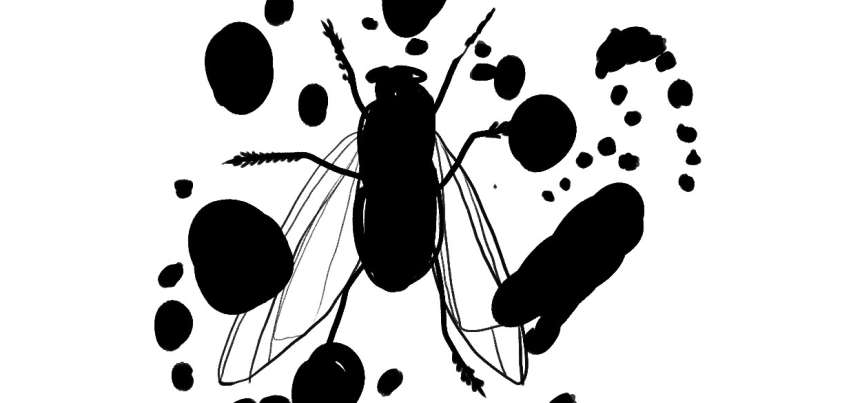 Katherine Mansfield‘s The Fly is about death, grief and aging. Two old men handle their sons’ wartime deaths differently. Six years have passed. Mr Woodifield, in poor health physically and mentally, has come to terms with the loss of his son. “The boss”, healthy and successful, still grieves… but not for his son. He laments the sacrifices he made in preparing the boy to take over his business, and shows his true character by torturing a fly. This leaves him feeling wretched and frightened. Could the fly’s struggles have reminded him that even the strongest (himself included) eventually die? More…
Katherine Mansfield‘s The Fly is about death, grief and aging. Two old men handle their sons’ wartime deaths differently. Six years have passed. Mr Woodifield, in poor health physically and mentally, has come to terms with the loss of his son. “The boss”, healthy and successful, still grieves… but not for his son. He laments the sacrifices he made in preparing the boy to take over his business, and shows his true character by torturing a fly. This leaves him feeling wretched and frightened. Could the fly’s struggles have reminded him that even the strongest (himself included) eventually die? More…
Swaddling Clothes
 The major theme of Yukio Mishima’s Swaddling Clothes is the loss of traditional Japanese values to Western modernization. Other themes include class, morality, gender roles, compassion, fear, and sacrifice/atonement. The callous swaddling of an illegitimate baby in newspaper and protagonist Toshiko’s conviction that it is destined to grow up a poverty-stricken criminal underlines Japan’s rigid class structure. Her husband’s heartless description of the delivery demeans women who contravene social norms. When Toshiko does this (by taking a walk alone at night to contemplate her own child’s future and unsatisfying Western lifestyle), she comes face to face with her prophesy. More…
The major theme of Yukio Mishima’s Swaddling Clothes is the loss of traditional Japanese values to Western modernization. Other themes include class, morality, gender roles, compassion, fear, and sacrifice/atonement. The callous swaddling of an illegitimate baby in newspaper and protagonist Toshiko’s conviction that it is destined to grow up a poverty-stricken criminal underlines Japan’s rigid class structure. Her husband’s heartless description of the delivery demeans women who contravene social norms. When Toshiko does this (by taking a walk alone at night to contemplate her own child’s future and unsatisfying Western lifestyle), she comes face to face with her prophesy. More…
The Outlaws
 The story from Selma Lagerlöf involves two medieval fugitives who meet and become close friends while hiding out in the Swedish wilderness. The men differ greatly in physique, confidence, class, religious belief and the seriousness of their crimes. One has murdered a monk; the other has admitted to stealing a fishing net. The only thing they have in common is that their charges arose because of manipulating women. To his ultimate cost, the murderer tries to help the fisherman (a pagan) by teaching him the fundamentals of Christianity. Themes: living in nature, mateship, culture, betrayal, religion, repentance, ‘justice’. More…
The story from Selma Lagerlöf involves two medieval fugitives who meet and become close friends while hiding out in the Swedish wilderness. The men differ greatly in physique, confidence, class, religious belief and the seriousness of their crimes. One has murdered a monk; the other has admitted to stealing a fishing net. The only thing they have in common is that their charges arose because of manipulating women. To his ultimate cost, the murderer tries to help the fisherman (a pagan) by teaching him the fundamentals of Christianity. Themes: living in nature, mateship, culture, betrayal, religion, repentance, ‘justice’. More…
Cranes
 Hwang Sun-won’s Cranes shows how humanity can outweigh ideology. Two childhood friends find themselves on opposite sides in the Korean War. One, a village commander, is captured and the other assigned to take him for interrogation and probable execution. When asked why he did not flee, the captured man talks about his aged father’s connection to the land. The other man can relate to this, because he carries the guilt of having left his family when he went away to war. This prompts the captor to suggest they go off on a crane hunt, as they did once as boys. More…
Hwang Sun-won’s Cranes shows how humanity can outweigh ideology. Two childhood friends find themselves on opposite sides in the Korean War. One, a village commander, is captured and the other assigned to take him for interrogation and probable execution. When asked why he did not flee, the captured man talks about his aged father’s connection to the land. The other man can relate to this, because he carries the guilt of having left his family when he went away to war. This prompts the captor to suggest they go off on a crane hunt, as they did once as boys. More…
What Shall We Do When We All Go Out?
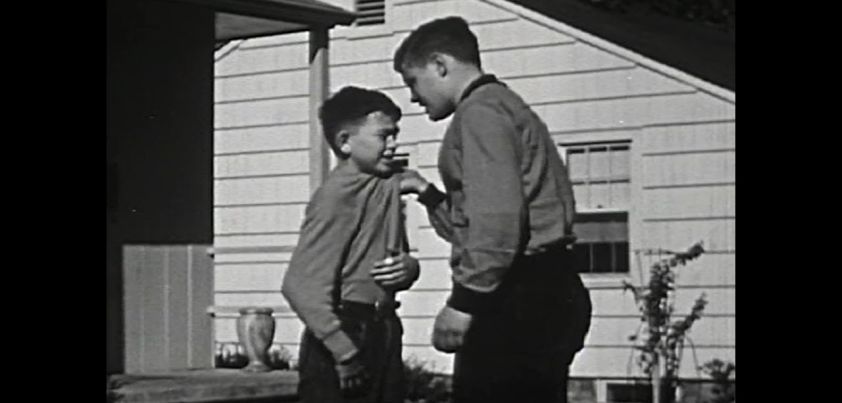 In this story by Gregorio Gregorio C. Brillantes, a nine-year-old Philippine boy’s childhood innocence is shattered over the course of a school term. His public servant father has been relocated to a large provincial town. The boy likes this town more than the smaller ones they had lived in, and is very happy in his new school. Two events destroy his comfortable outlook on the world: the death of a classmate followed by a school field-trip to view his body, and his forced initiation under threat of violence into a gang of older students. Themes include innocence, death, violence, intimidation, fear. More…
In this story by Gregorio Gregorio C. Brillantes, a nine-year-old Philippine boy’s childhood innocence is shattered over the course of a school term. His public servant father has been relocated to a large provincial town. The boy likes this town more than the smaller ones they had lived in, and is very happy in his new school. Two events destroy his comfortable outlook on the world: the death of a classmate followed by a school field-trip to view his body, and his forced initiation under threat of violence into a gang of older students. Themes include innocence, death, violence, intimidation, fear. More…
The Ordinary Son
 The story from Ron Carlson is a satire of 1960s life and its fixation with science, war, protest and material possessions. Protagonist Reed had a spartan, lonely childhood. His parents (NASA physicist father and poet/activist mother) are eccentric geniuses. His brother and sister are equally intelligent. When Reed discovers he is “ordinary”, he feels a sudden sense of relief and freedom. He gets a low-level job, buys a car, drinks beer and goes fishing for the first time, and fantasizes over a lewd picture he sees in a magazine. Themes: family, materialism, diversity, pressure to meet expectations, work/life balance, sexuality. More…
The story from Ron Carlson is a satire of 1960s life and its fixation with science, war, protest and material possessions. Protagonist Reed had a spartan, lonely childhood. His parents (NASA physicist father and poet/activist mother) are eccentric geniuses. His brother and sister are equally intelligent. When Reed discovers he is “ordinary”, he feels a sudden sense of relief and freedom. He gets a low-level job, buys a car, drinks beer and goes fishing for the first time, and fantasizes over a lewd picture he sees in a magazine. Themes: family, materialism, diversity, pressure to meet expectations, work/life balance, sexuality. More…